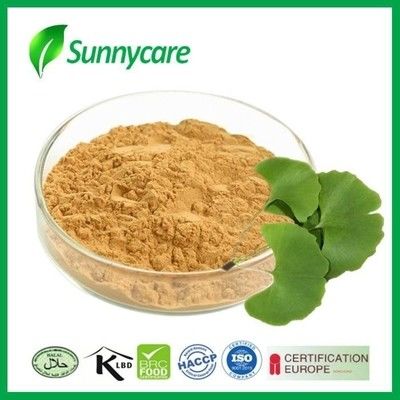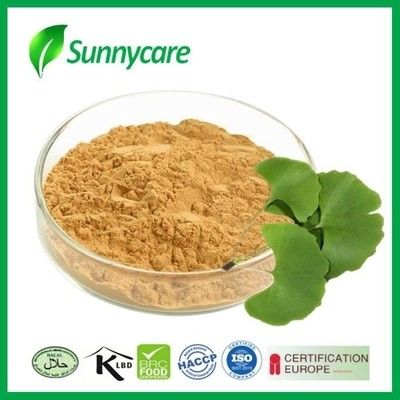Antioxidant Ginkgo Biloba Leaf Extract Flavone Glycosides 24% Terpene Lactones 6%
| Product Name | Ginkgo Biloba Extract | Latin Name | Ginkgo Biloba L. |
|---|---|---|---|
| Appearance | Light Greenish Yellow Or Brown Yellow Powder | Part Of The Plant Used | Leaf |
| Extract Method | Ethanol & Water | Specification | Flavonoids |
| Highlight | Antioxidant Ginkgo Biloba Leaf Extract,ISO9001 Ginkgo Biloba Leaf Extract,Antioxidant Ginkgo Biloba Extract |
||
Ginkgo Biloba Extract Flavone Glycosides 24% Terpene Lactones 6%
Product Name: Ginkgo Biloba Extract
Latin Name: Ginkgo Biloba L.
Appearance: Light Greenish yellow or Brown yellow Powder
Specification: Flavonoids /Ginkgolides+bilobalide (24/6),HPLC
Flavonoids 22%-27%,HPLC & Terpene lactons 5.4%-12%
Part of the Plant Used: Leaf
Extract Method: Ethanol & Water
Effect and application of ginkgo biloba extract
1. Effect on cardiovascular system
Ginkgo biloba extract can inhibit the activity of angiotensin-converting enzyme (ACE) in normal human serum, thereby inhibiting the constriction of small arteries, dilating blood vessels and increasing blood flow. Ginkgo biloba terpene lactones are highly specific PAF receptor blockers. Ginkgo biloba leaf extracts or ginkgo biloba biloba terpene lactones can inhibit platelet activating factor (PAF) and cyclooxygenase or lipid oxidase. Ginkgo biloba extract was well tolerated and antagonized platelet aggregation induced by PAF, but had no effect on ADP aggregation.
2. Effects on the central nervous system
By inhibiting the action of PAF, Ginkgo biloba extract can affect the endocrine system and the interaction between the immune system and the central nervous system, promote brain circulation and metabolism, and improve memory function. In addition to ameliorating deficient memory impairment caused by NaNO2, its antihypoxic effect may be related to increasing cerebral blood flow and improving cerebral energy metabolism during hypoxia. Ginkgolide B can be used in the clinical treatment of stroke.
3. Effect on digestive system
Ginkgo biloba extract can significantly improve gastric and intestinal ulcers induced by PAF and endotoxin, and partially inhibit gastric damage caused by alcohol. It has potential therapeutic effect on cirrhosis. Ginkgo terpene lactone B may play a role in the treatment of acute pancreatitis.
4. Effect on respiratory system
The ethanol extract of Ginkgo biloba has a direct relaxation effect on tracheal smooth muscle. Inhalation of atomized ginkgo biloba extract not only inhibited bronchoconstriction, but also inhibited the decrease of white blood cells and eosinophils caused by PAF. Ginkgo biloba biloba biloba extract has great significance in inhibiting and treating bronchial hyperreactivity.
5. Anti-aging effect
Ginkgo biloba, isoginkgo biloba, ginkgo biloba and quercetin in ginkgo biloba leaves can inhibit lipid peroxidation, especially quercetin has stronger inhibitory activity.
6. Role in transplant rejection and other immune responses
Ginkgo biloba extract can prolong the survival time of skin graft, heterotopic heart xenograft and orthotopic liver xenograft. Ginkgo biloba extract can inhibit the natural killer cell activity of human body against KC526 target cells and also prevent the natural killer cell activity induced by interferon.
7. Anti-tumor effect
The crude extract of Ginkgo biloba leaves, namely the fat soluble part, can inhibit Epstein-Barr virus, and both heptarecene salicylic acid and ginkgoflavin have strong inhibitory activities. The total flavonoids of Ginkgo biloba can increase the thymus weight and SOD activity level of tumour-bearing mice, and mobilize the intrinsic anti-tumor ability of the body. Quercetin and myricetin can inhibit the occurrence of carcinogens.
8. Antioxidant effects
Ginkgo biloba leaf extract can directly eliminate lipid free radicals, lipid peroxidation free radicals and alkane free radicals, and terminate the chain reaction of free radicals. At the same time, it can also participate in regulating and improving the activity of antioxidant enzymes such as peroxide dismutase and glutathione peroxidase. The antioxidant effect of flavonoids in EGB even exceeds that of vitamins, and has anti-free radical attack properties in vitro.
![]()




